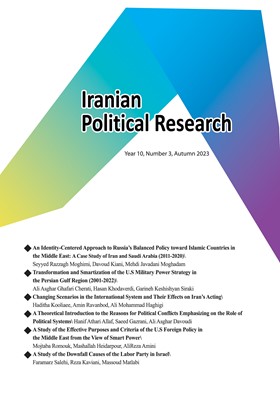A Study of the Effective Purposes and Criteria of the U.S Foreign Policy in the Middle East from the View of Smart Power
Subject Areas : Iranian Political ResearchMojtaba Romouk 1 , Mashallah Hedarpour 2 * , AliReza Amini 3
1 - P.hD., Student, Department of Political Science, Qom Branch, Islamic Azad University, Qom, Iran.
2 - Assistant Professor, Department of Political Science, Qom Branch, Islamic Azad University, Qom, Iran
3 - Assistant Professor, Department of Political Science, Qom Branch, Islamic Azad University, Qom, Iran.
Keywords: hard power, Soft power, Foreign policy, Smart Power, Middle East, U.S,
Abstract :
The purpose of the present research is to study effective purposes and criteria of the U.S foreign policy in the Middle East from the view of smart power. The research method is descriptive-analytic and the results showed that experiences of the past decades convinced the White House politicians to adopt smart power policy for collaboration and opposition as well as peaceful methods for making relations with middle eastern countries. Therefore, a new perspective was opened in western relations with the Middle East. Smart power and all its criteria made the White House politicians attempt to follow their objectives by that. Their purposes include rebuilding the U.S deteriorated foreign policy image during recent decades, public opinion management in the Middle East, improvement and betterment of its executive policies in the region, avoidance of coalition in the region against the U.S and Israel, supporting the emergence of moderate governments based on liberal democracy, sustenance of relative peace and stability in the region according to the U.S favorites, and maintenance of military bases in the U.S allies’ countries.
احمدپور، حسین؛ جعفرپناه، مهدی (1390). ریشههای کسب قدرت در اسلام. روابط فرهنگی، 1(4)، ص56-39.
بخشی، رامین (1396). اهداف و سناریوهای آمریکا برای ناامنسازی باب المندب. خبرگزاری رسا. قابل دسترس در: https://rasanews.ir/fa/news/ 502646.
بیگی، مهدی (1389). قدرت نرم جمهوری اسلامی ایران: مطالعه موردی لبنان. تهران: انتشارات دانشگاه امام صادق(ع).
روشندل، جلیل؛ سیفزاده، حسین (1382). تعارضات ساختاری در منطقه خلیج فارس. تهران: انتشارات مرکز مطالعات خاورمیانه.
زواری، سید عبدالمجید؛ عفراوی، جواد (1400). سناریوهای آینده برای یمن: پیامدها، چالشها و فرصتهای جمهوری اسلامی ایران. تهران: اندیشکدۀ روابط بینالملل.
سلیمانی پورلک، فاطمه (1389). قدرت نرم در استراتژی خاورمیانهای آمریکا. تهران: پژوهشکده مطالعات راهبردی.
سلیمانی، رضا (1391). رویکرد تئوریک به سیاست آمریکا در قبال انقلاب اسلامی ایران و بیداری اسلامی در خاورمیانه. پژوهشنامه انقلاب اسلامی، 1(2).
شیرازی، حسن؛ مرادیان، محسن (1389). بررسی میزان تأثیر هر یک از عوامل محسوس قدرت در شکلگیری قدرت نظامی. سیاسی دفاعی، 18(72).
عالیشاهی، عبدالرضا؛ سالاروند، معصومه؛ محمودی، سعید (۱۳۹۵). ردی بر ارتداد؛ جنبشهای تروریستی- تکفیری در جهان اسلام. مشهد: انتشارات مینوفر.
قربانی شیخنشین، ارسلان؛ کرمی، کامران؛ عباسزاده، هادی (1390). قدرت هوشمند؛ تحول نوین قدرت در عصر جهانی شدن. روابط خارجی، 3(4).
قلخانباز، خلیل (1389). قدرت هوشمند آمریکا علیه ایران. تهران: انتشارات حنیفا.
گلشنی، علیرضا؛ باقری، محسن (1391). جایگاه حزبالله لبنان در استراتژی بازدارندگی جمهوری اسلامی ایران. تحقیقات سیاسی و بینالمللی، 4(11).
مورگنتا، اچ. (1373). سیاست در میان ملل: مبارزه برای قدرت و صلح. ترجمه حمیرا مشیرزاده. تهران: انتشارات وزارت امور خارجه.
نای، جوزف (1382). قدرت نرم، سیاست خارجی. ترجمه حسینیمقدم. راهبرد، شماره 29.
نای، جوزف (1392). آینده قدرت. ترجمه احمد عزیزی. تهران: نشر نی.
هرسیج، حسین؛ تویسرکانی، مجتبی (1388). مقایسه میزان قدرت نرم جمهوری اسلامی ایران و ایالات متحده آمریکا. دانش سیاسی، 5(1).
واعظی، محمود؛ احدی، افسانه (1389). دیپلماسی عمومی و سیاست خارجی. تهران: مرکز تحقیقات استراتژیک.
Byman, D.L. & Pollack, K.M. (2011). Regional Actors the Changing Balance of Power in the Middle East. In: The Arab Awakening America and the Transformation of the Middle East. Washington, D.C.: Brookings institution press. East Studies, No. 34.
Habibi, N. & Woertz, E. (2009). U.S. Arab Economic Relations and the Obama Administration. Brandeis University, Crown Center for Middle
Ottaway, M. & Carothers, T. (2004). The Greater Middle East Initiative: off to a False Start. Carnegie Endowment for International Peace.
Wilson, E.J. (2008). Hard Power, Soft Power, Smart Power. The Annals of the American Academy of Political and Social Science.
_||_
